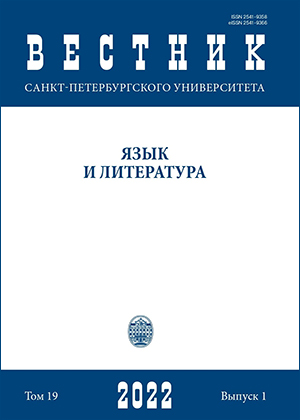Nikolay Gumilyov’s toponymical epithets
DOI:
https://doi.org/10.21638/spbu09.2022.109Abstract
This article analyzes functions and semantics of epithets pertaining to geographical names (topopoetonyms) in Gumilyov's poems. Among 206 proper names and 77 epithets are definitions containing emotional assessment: crazy Africa (“Love Island”), kingly Niger (“Niger”) and color characteristics: golden Baghdad (“Pilgrim”), green Siberia (“Sahara”) prevailed. The epithet in genitival constructions usually refers to the main word of the nominal group: Tsargrad's golden gate (“Sweden”), green waves of the Euphrates (“Adam's Dream”), but in the periphrases it can be given to a geographical name: the queen of boundless Rus (i. e. Moscow, “Muzhik”). The analysis of the most common definitions (distant, remote; ancient; mysterious) showed that the epithet in the poetic text conveys several dictionary meanings, and its semantics are befogged by contextual connotations. Thus, the epithet distant to the topopoetonym Siberia (“Modernity”) express the idea of remoteness both in time and space, while the image of Siberia opens up a special space of poetic world — a place where the past continues in the present. In the poem “Galla”, the idea of opposing different cultures, is conveyed through the image of remote and wild Russia, as it is presented through the voice of a teacher of Islam. The definition ancient (“Words to Davydov's music”, “Rhodes”) in Gumilyov's poems also creates a temporal perspective of poetic description, has a positive connotation referring to high importance of the object designated by the topopoetonym, while the epithet mysterious (e. g. Rus, the poem “Old estates”) has an additional meaning — ‘associated with sacrament’.
Keywords:
N.Gumilyov, linguistic poetics, name semantics, poetonym, epithet
Downloads
References
Голубцова и др. 2019 — Голубцова Н. В., Матвеева О. Н., Гелашвили Е. Н., Папшева Г. О. Цветовые эпитеты в поэзии Н. С. Гумилева. Известия Воронежского государственного медицинского университета. 2019, 4 (28): 190–197.
Дроздова 2011 — Дроздова С. В. Семантика цвета в поэзии Н. С. Гумилева. В кн.: Интеллектуальный потенциал XXI века: ступени познания. Новосибирск: Центр развития научного сотрудничества, 2011, (5–1): 134–139.
Калинкин 2016 — Калинкин В. М. Знакомьтесь: поэтонимология. Вестник Тамбовского университета. Сер.: Филологические науки и культурология. 2016, 4 (8): 18–27.
Москвин 2006 — Москвин В. П. Русская метафора: Очерк семиотической теории. М.: Ленанд, 2006.
Плунгян 2008 — Плунгян В. А. Корпус как инструмент и как идеология: о некоторых уроках современной корпусной лингвистики. Русский язык в научном освещении. 2008, 2 (16): 7–20.
Раскина 2009 — Раскина Е. Ю. Основные понятия, образы и символы сакральной географии Н. С. Гумилева. Вестник Вятского государственного гуманитарного университета. 2009, 2 (2): 143–147.
Слободнюк 1992 — Слободнюк С. Л. Н. С. Гумилев. Проблемы мировоззрения и поэтики. Душанбе: Сино, 1992.
Фадеева 2011 — Фадеева Т. М. Взаимодействие сложного эпитета в художественном тексте с другими средствами выразительности. Вестник Московского государственного областного университета. Сер.: Русская филология. 2011, (4): 47–54.
Фатеева 1997 — Фатеева Н. А. Интертекстуальная организация времени. В кн.: Логический анализ текста. Язык и время. Арутюнова Н. Д., Янко Т. Е. (отв. ред.). М.: Индрик, 1997. С. 321–328.
Щерба 2007 — Щерба Л. В. Опыты лингвистического толкования стихотворений. В кн.: Щерба Л. В. Избранные работы по русскому языку. М.: Аспект пресс, 2007. С. 26–44.
Голубцова и др. 2019 — Golubtsova N. V., Matveeva O. N., Gelashvili E. N., Papsheva G. O. Color epithets in the poetry of Nikolay Gumilyov. Izvestiia Voronezhskogo gosudarstvennogo meditsinskogo universiteta. 2019, 4 (28): 190–197. (In Russian)
Дроздова 2011 — Drozdova S. V. Semantics of color in the poetry of Nikolay Gumilyov. In: Intellektual'nyi potentsial XXI veka: stupeni poznaniia. Novosibirsk: Tsentr razvitiia nauchnogo sotrudnichestva Publ. 2011, (5–1): 134–139. (In Russian)
Калинкин 2016 — Kalinkin V. M. Become acquainted: Poetonymology. Vestnik Tambovskogo universiteta. Seriia: Filologicheskie nauki i kul'turologiia. 2016, 4 (8): 18–27. (In Russian)
Москвин 2006 — Moskvin V. P. Russian metaphor: Essay on semiotic theory. Moscow: Lenand Publ., 2006. (In Russian)
Плунгян 2008 — Plungian V. A. Corpus as a tool and as an ideology: on several lessons on modern corpus linguistics. Russkii iazyk v nauchnom osveshchenii. 2008, 2 (16): 7–20. (In Russian)
Раскина 2009 — Raskina E. Iu. Basic concepts, images and symbols of the sacred geography of Nikolay Gumilyov. Vestnik Viatskogo gosudarstvennogo gumanitarnogo universiteta. 2009, 2 (2): 143–147. (In Russian)
Слободнюк 1992 — Slobodniuk S. L. N. S. Gumilyov. Issues of worldview and poetics. Dushanbe: Sino Publ., 1992. (In Russian)
Фадеева 2011 — Fadeeva T. M. The interaction of a complex epithet in a literary text with other sources of expression. Vestnik Moskovskogo gosudarstvennogo oblastnogo universiteta. Seriia: russkaia filologiia. 2011, (4): 47–54. (In Russian)
Фатеева 1997 — Fateeva N. A. Intertextual organization of time. In: Logicheskii analiz teksta. Iazyk i vremia. Arutiunova N. D., Ianko T. E. (eds). Moscow: Indrik Publ., 1997. P. 321–328. (In Russian)
Щерба 2007 — Shcherba L. V. Experience of the linguistic interpretation of poems. In.: Shcherba L. V. Izbrannye raboty po russkomu iazyku. Moscow: Aspekt Press Publ., 2007. P. 26–44. (In Russian)
Downloads
Published
How to Cite
Issue
Section
License
Articles of "Vestnik of Saint Petersburg University. Language and Literature" are open access distributed under the terms of the License Agreement with Saint Petersburg State University, which permits to the authors unrestricted distribution and self-archiving free of charge.






